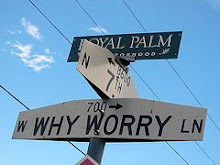I came home shaking today and holding back tears. The drivers here scare me. They're aggressive and impatient and seem to be a bit self-centered. The incident: I was driving in my neighborhood, cruising down a small neighborhood road at fives miles ABOVE the speed limit when the large black SUV behind me becomes impatient, shoots into the opposite lane of traffic, and passes me.
What was that all about? I thought to myself. I wasn't driving that slow. After that, I'm so jarred that I have to slow down. This causes another car behind me to honk and I just become even more panicked. So I turn into a driveway just to get myself off the road and away from these people. At this point, I'm so shaken that I can't drive much anymore. I manage to make it home but then I collapse into the couch, uncontrollably shaking. I've already hated driving for years, and driving in this area just makes me all the more anxious. I call Matthew and he tries to calm my fears.
"I think I'm just anxious," I say. "Maybe I should take some medication for it."
"Sweetheart, I want you to go to a counselor," he told me.
"I don't know, Matt," I hesitate. I wasn't exactly rich and counselors weren't exactly cheap.
Matt keeps reassuring me, telling me that he also hates driving up where I live. "It's irritates me. You remember the ambulance?"
When Matt and I were driving around, we witnessed several cars continuing to drive along the road, preventing an ambulance from making a left turn. "It's an ambulance!" Matt growled in frustration. I understood his frustration; drivers around here seemed too wrapped-up in their own silly little lives to even let an ambulance through.
It's strange because I get the feeling that these people are actually nice whenever you meet them in public. It's just when they start driving that they become these impatient, aggressive road rage machines. It's scary. However, I do think part of the problem is just me, that I'm overly anxious about driving and their "assertive" attitudes don't do well for my already high levels of nervousness.
What was that all about? I thought to myself. I wasn't driving that slow. After that, I'm so jarred that I have to slow down. This causes another car behind me to honk and I just become even more panicked. So I turn into a driveway just to get myself off the road and away from these people. At this point, I'm so shaken that I can't drive much anymore. I manage to make it home but then I collapse into the couch, uncontrollably shaking. I've already hated driving for years, and driving in this area just makes me all the more anxious. I call Matthew and he tries to calm my fears.
"I think I'm just anxious," I say. "Maybe I should take some medication for it."
"Sweetheart, I want you to go to a counselor," he told me.
"I don't know, Matt," I hesitate. I wasn't exactly rich and counselors weren't exactly cheap.
Matt keeps reassuring me, telling me that he also hates driving up where I live. "It's irritates me. You remember the ambulance?"
When Matt and I were driving around, we witnessed several cars continuing to drive along the road, preventing an ambulance from making a left turn. "It's an ambulance!" Matt growled in frustration. I understood his frustration; drivers around here seemed too wrapped-up in their own silly little lives to even let an ambulance through.
It's strange because I get the feeling that these people are actually nice whenever you meet them in public. It's just when they start driving that they become these impatient, aggressive road rage machines. It's scary. However, I do think part of the problem is just me, that I'm overly anxious about driving and their "assertive" attitudes don't do well for my already high levels of nervousness.
